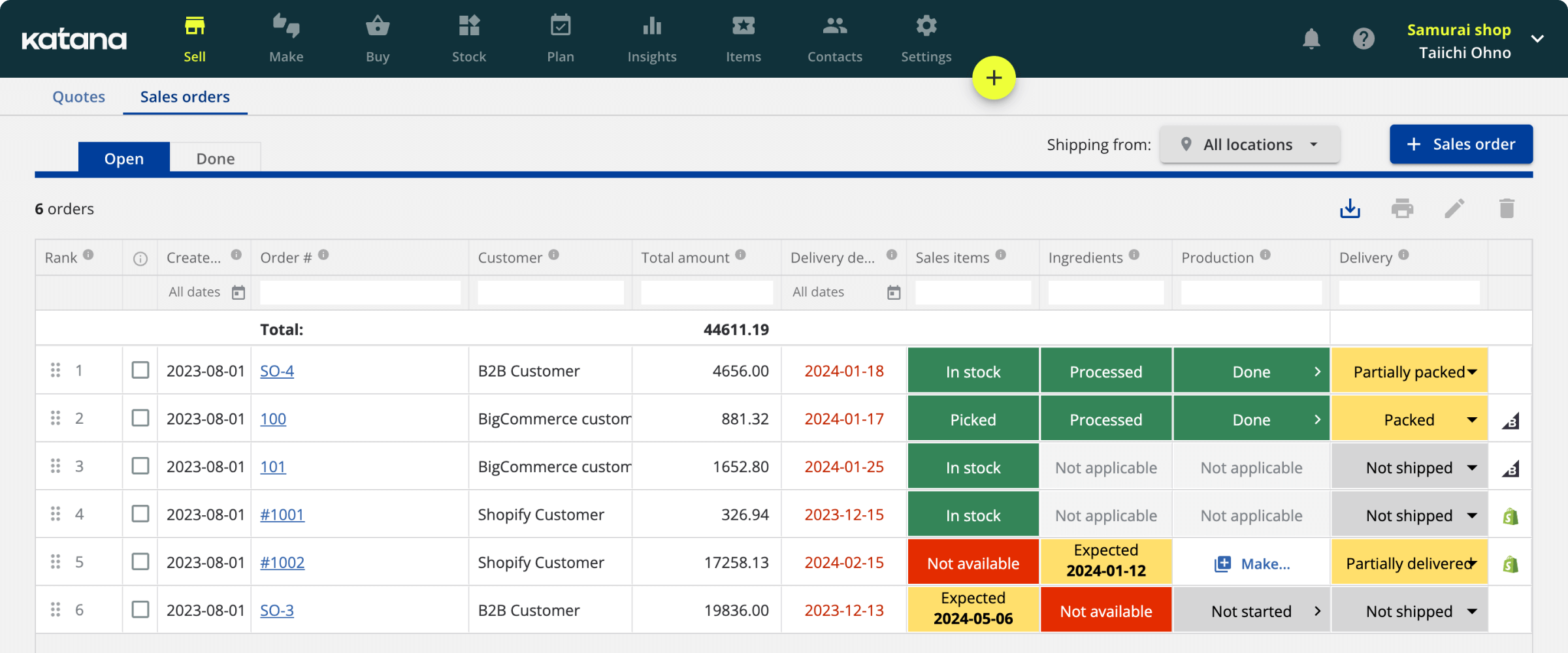Manufacturer ecommerce: Dawn of a new entrepreneur

What if Santa Claus could increase his efficiency without breaking his back to reach kids around the world in one night? As the ultimate manufacturer, Santa could set up a magical online toy store. In this digital workshop, children from every corner of the globe could browse through an endless array of toys, bypassing traditional intermediaries like toy stores or malls.
Just as Santa’s online toy store expands his global reach, ecommerce empowers manufacturing businesses to tap into new markets and connect with consumers beyond their local borders. Traditionally seen as a logistical hurdle due to remote production and inventory costs, ecommerce can actually yield significant advantages when done right.
Ecommerce presents both opportunities and challenges for manufacturing companies. This is why it requires a strategic approach to maximize benefits and mitigate risks. But fear not, we’re here to spread some knowledge, just like Santa spreads joy and happiness.
What does ecommerce for manufacturers look like?
Companies that use ecommerce within their manufacturing operations have various options available to them.
These include:
- Setting up an online store to sell directly to consumers
- Creating a digital marketplace where buyers and sellers can connect
- Using B2B platforms to connect with wholesalers, retailers, and other businesses
Manufacturers may also take advantage of automated inventory tracking systems and analytics tools to monitor sales performance and identify areas that need improvement. Additionally, they can benefit from digital marketing strategies such as SEO (Search Engine Optimization) and targeted campaigns. By leveraging the power of ecommerce, manufacturers can experience increased efficiency in their operations while expanding their reach into new global markets.
With the right ecommerce solutions, manufacturers can create a competitive advantage and drive their business forward.
Ecommerce is an effective way for manufacturers to engage with customers, build trust, and develop relationships.
Through personalization features such as tailored product recommendations and automated customer service responses, businesses can create a better shopping experience to keep customers coming back. Manufacturers can also use data from ecommerce sales to gain insights into consumer behavior and make informed decisions about:
- Product development
- Pricing strategies
- Marketing campaigns
- and so much more
By leveraging the latest technologies in ecommerce, manufacturers can remain competitive in today’s market and achieve greater success in the future.
And that’s all good in the hood, but what exactly are the different forms of ecommerce available for a manufacturer who wants to be ecommerce focused?
The cold hard facts for a manufacturer ecommerce business
- 9% of the total B2B product sales in the US came from ecommerce pre-covid — eMarker report
- 98% of surveyed manufacturers in 2021 said they plan to implement ecommerce into their sales process. While 42% of those manufacturers who had already invested in ecommerce said that it improved customer relationships — Sana Commerce whitepaper
- 66% of manufacturers in the US agreed that implementing ecommerce is a “high” or “very high” priority — PwC survey
- 65% of B2B buyers research products online, while 86% prefer to reorder via the internet instead of speaking to a sales representative — Gartner press release
- The global B2B ecommerce market size, with a CAGR of 19.7%, is expected to reach $33,317.37 billion by 2030 — Research and Markets report
- Due to Covid-19, mobile sales increased by 250% — McKinsey and Company
Models of ecommerce for manufacturers
We can’t talk about ecommerce in manufacturing without addressing the models first. Santa’s digital workshop is a quintessential B2C model with a direct-to-consumer strategy that allows Santa’s goods to reach kids directly through his own channel. Yet, when hearing about ecommerce in manufacturing, most of us think about B2B ecommerce, meaning the online trade of goods and services between businesses.
Below are the three models of ecommerce for manufacturers. And yes, each approach requires distinct strategies and technological infrastructure to reap the benefits of online sales.
Business-to-business
B2B revolves around the digital exchange of goods and services among businesses. B2B ecommerce for manufacturers predominantly facilitates interactions among manufacturers, wholesalers, distributors, and retailers. B2B transactions often involve bulk orders and intricate supply chains compared to B2C transactions. By digitizing processes such as sales order processing, payment transactions, and logistics management, businesses can enhance efficiency and productivity.
Business-to-consumer
B2C ecommerce involves a single seller or business providing products or services to multiple customers. For example, an Adidas store selling the brand’s shoes operates under a B2C model. The focus here is on catering to the needs and preferences of individual consumers, offering products to meet specific customer demands.
Direct-to-consumer
Considered more of a subset of the B2C strategy, D2C typically involves businesses operating their own online stores or platforms to reach their target audience directly. D2C ecommerce refers to brands that sell their products directly to customers without involving retailers, wholesalers, or any intermediaries. This model fosters a transparent trade relationship between the brand and the consumer. Essentially, it cuts the middleman, allowing brands to have more control over their product pricing, marketing strategies, and customer interactions.

What are the different manufacturer ecommerce platforms?
There are various ways to approach ecommerce available to manufacturers, each with its pros and cons.
1. Online marketplaces
This type of platform is typically hosted by a third-party marketplace provider such as eBay or Amazon.
Merchants sign up for the platform and can list their products for sale online. The main advantage of an online marketplace is that it provides merchants with ready-market access and visibility since customers already shop there. One of the main disadvantages of using an online marketplace is that buyers may not be able to inspect the product before buying it — which will dissuade them and force them to favor products with the most reviews.
2. Web storefronts
A web storefront is theoretically the simplest method for selling your goods on the internet.
It requires building your own website from scratch where you can host products and manage orders, payments, and shipping information yourself — meaning you have more control over every aspect of your business.
An advantage to web storefronts is that they are easily accessible to anyone with an internet connection — making them incredibly convenient for customers who want to purchase items quickly and efficiently without visiting a physical store. A disadvantage to web storefronts is they require a high level of technical expertise to set up and maintain, which can be expensive for businesses.
3. Mobile shopping apps
Today, many customers are using their mobile phones to shop online, so it’s important to have a mobile-friendly and responsive platform.
This type of platform allows customers to shop from their smart devices, making the shopping experience easier, faster, and more convenient. An advantage of mobile shopping apps is that they keep customers updated with new arrivals and products. However, a disadvantage is that mobile shopping apps are not immune to technical issues such as bugs, crashes, and slow loading times.
4. Social media shopping platforms
Many businesses are taking advantage of the power of social media by creating their own stores on popular social networks like Facebook, Instagram, and Twitter.
This type of manufacturer ecommerce platform connects shoppers directly with brand manufacturers, enabling them to purchase products without leaving the social site they’re already using. The ability to browse, compare, and purchase products on one platform makes online shopping easier. Which is a blessing, and a curse, as the high level of competition makes it difficult for a potential customer to choose your products.
No matter which manufacturing ecommerce channel you decide to use, it is important to do your research and pick the one that best suits your needs.
By taking the time to understand the different types of platforms available, you can ensure that you make the right choice for your business. Investing in a quality ecommerce platform can give your customers a smooth and secure shopping experience and start selling online quickly and easily.

Why is a manufacturing ecommerce platform important?
Ecommerce stores are becoming essential for manufacturers who want to remain competitive in the global market.
A manufacturer can showcase their products, reach more customers, and increase their sales by having an online presence. Having an online store also allows them to provide better customer service by providing up-to-date information on product availability and prices. Additionally, it enables them to offer discounts or loyalty programs that can attract more customers and generate more revenue.
With an online store, manufacturers can also track customer behavior and purchase history, which helps them understand their target audience better and develop marketing strategies accordingly.
This way, they can optimize their website for improved user experience and increase conversions.
Finally, by having an ecommerce store, manufacturers can make their business more efficient and cost-effective as they can easily manage their inventory, process orders, and offer customer support.

How to dominate as a manufacturer ecommerce merchant
By leveraging the power of ecommerce, manufacturers can increase their customer base and expand their sales.
In order to successfully use ecommerce for manufacturing, there are several key considerations you need to know about.
1. Identifying your target audience
The first step in using ecommerce effectively is to identify your target audience.
Knowing who you are selling your products or services to will help you determine which platforms and strategies you should use. It’s essential to understand who your customers are so that you can create content and tailor it specifically for them.
2. Pricing your products
Another critical factor is product pricing.
When selling online, it’s important to price your products competitively. This will help ensure that you remain competitive in the online marketplace and can effectively reach your target market.
3. Streamlining your checkout process
In addition, you should consider streamlining the purchasing process.
You can increase conversions and ultimately boost sales by making it easier for customers to purchase your products. You can ensure that checkout is fast, secure, and intuitive.
4. Marketing your business
Finally, manufacturers need to focus on marketing their products or services through various channels, such as email campaigns and social media platforms, to reach more potential customers.
Manufacturers should also use analytics tools to measure the success of their ecommerce campaigns and make any necessary adjustments or improvements moving forward.
By taking all these steps and considerations into account, manufacturers can maximize their impact in the ecommerce space and reach a wider customer base. With an optimized ecommerce strategy, manufacturers can enjoy increased profits and success.
Once you have established your audience, product pricing, streamlined purchasing process, and marketing strategy for your online store, it’s important to ensure that all of these elements are properly maintained.
This includes:
- Tracking and inventory control
- Managing orders
- Monitoring customer feedback
Staying on top of these details will help you quickly identify areas where improvements can be made to remain competitive in the online marketplace.
Additionally, attending events and participating in online forums is essential to stay up to date with manufacturing trends. Doing so will help you stay informed of new developments and technologies that can be used to improve your ecommerce operations.
By following these tips, manufacturers can use ecommerce effectively for their businesses and increase revenues. With the right strategies in place, manufacturers can successfully reach a broader customer base and increase profits.

What to consider before setting up your manufacturer ecommerce store?
When creating an ecommerce sales channel as a manufacturer, there are a few key things to consider to ensure success.
First and foremost, it is important to create a visually appealing website and make it easy to navigate. The site’s design should be professional and user-friendly, as this will help attract potential customers. It should also feature clear calls to action that urge shoppers to purchase products or sign up for newsletters. Additionally, it is important to ensure the website has secure payment processing systems so that customers feel comfortable making purchases on the site.
Next, it is essential to focus on SEO.
SEO helps bring organic traffic to the website by improving its ranking on search engine results. This entails optimizing the website with relevant keywords, implementing link-building strategies, and using social media to promote the site.
Finally, it is important to have a plan for customer service and support.
Customers need to be able to contact the store in case they have any questions or problems. Having a customer service team available to respond quickly and efficiently will help ensure customer satisfaction. Additionally, having an FAQ section on the website can be beneficial as it will provide customers with quick answers to common questions regarding:
- Orders
- Shipping
- Product descriptions
When you’re creating a manufacturer ecommerce store, you can boost your sales by providing customers with a pleasant online shopping experience by keeping these factors in mind. With an attractive website design, effective SEO, and customer service protocols in place, businesses can ensure that their ecommerce store is a success.

What are the benefits of selling via ecommerce for manufacturers?
In manufacturing, ecommerce can be a shortcut to optimizing supply chains. Let’s dive into the advantages that make ecommerce a game-changer for manufacturing businesses:
- New customers — An improved online presence leads to better search engine visibility and an expanded customer reach. The logic here is simple, and relies on having your goods available online and ready to be accessed by those who cannot physically visit retail stores or other distribution channels where your goods are sold.
- Better demand forecast — Ecommerce, together with optimal supply chain management, allows for minimizing excess inventory. This leads to reduced storage costs and less capital tied up in stagnant inventory. Additionally, it mitigates risks associated with damage, such as from storms or floods, and prevents inventory obsolescence, ultimately lowering insurance premiums.
- Better customer experience — Never underestimate the power of an accessible platform to showcase your products with comprehensive information and engaging content. Think of online stores as virtual showrooms where consumers can browse your items or services at any time of the day. This alone allows for better customer engagement and satisfaction.
- Cost reduction — Selling digitally can lead to some serious savings. Say goodbye to extensive physical inventory displays in stores, complicated streamlining operations, and inventory insurance. By cutting down on expenses related to managing retail spaces, shipping, or storage, manufacturers can focus on reaching more customers without breaking the bank.
- Profit boost — While we’re on the financial aspect, increased profitability is another advantage of ecommerce for manufacturers. By cutting out the middleman through online sales, manufacturers can retain full margins for their products or services. This approach boosts profitability by eliminating the need to share profits with distributors and wholesalers. At the same time, it also satisfies the growing trend of customers wanting to engage directly with brands.
An example of manufacturers using ecommerce for sales
Raw Coffee Company leverages several cloud-based tools to become the ultimate manufacturer ecommerce seller. All the way from sales to manufacturing and beyond, ecommerce tools have helped them:
- Improve on-time order fulfillment by nearly 60% and increase efficiency of day-to-day operations by 40%
- Batch and expiry date tracking helps them optimize inventory management for raw materials and finished goods by 30%
- Integrations between sales, manufacturing, and accounting software help keep all their key business tools in sync
What are the challenges of selling via ecommerce for manufacturers?
One thing we can all agree on is that the manufacturing industry faces constant pressure to enhance the effectiveness of sales. Sure, embracing ecommerce strategically can revolutionize manufacturers’ sales approach and propel their businesses. But in order to achieve sustained growth and competitiveness, it’s crucial to have a thorough understanding of the opportunities, as well as the challenges of the digital marketplace.
Manufacturers may encounter various ecommerce-related hurdles that can affect operational efficiency, customer satisfaction, and overall profitability. Most of these obstacles stem from the intricacies of overseeing inventory, orders, and logistics within supply chains.
Let’s check out some of the most common ecommerce challenges for manufacturers:
- Finding and building an audience — Standing out in the digital crowd takes some effort. If you want to attract and retain customers, you need bulletproof marketing strategies to build that coveted online presence. This goes beyond search engine optimization and making sure your products are easily discoverable amid the vast online marketplace. You need to craft compelling stories and product listings, while also engaging with your audience on just about every social media platform out there.
- Inventory management — Keeping tabs on inventory in the digital realm requires some savvy tools. Ecommerce relies on efficient inventory management systems to track product availability and fulfill orders promptly. So, there’s no way around it — manufacturers must invest in the right order management systems to handle the complexities of online sales channels and to keep customers happy.
- Sustaining sales growth — Keeping consumers happy is only half the journey. You also need to keep them coming back. Sure, online platforms facilitate that initial purchase, but retaining customer engagement and loyalty post-purchase is tricky. So, it’s important to remember that the first sale is just the beginning. In order to foster long-term relationships with the audience, online marketplaces must continuously engage customers through targeted marketing, personalized experiences, and support.
- Making the digital transition — Transitioning to ecommerce, in and of itself, poses challenges for manufacturers. That’s mostly due to the rapid pace of digital transformation. An outdated look, a non-intuitive interface, or small tech bugs are just some of the things that can turn customers away in the blink of an eye. Manufacturers need to embrace change and stay updated on new technologies that can enable them to respond effectively to market shifts. The foundation for driving innovation is employee training programs and constant investment in digital platforms.

So why do manufacturers still hesitate to try ecommerce?
Given everything covered in this guide, you would think it’d be an open and shut case when deciding to transition to a manufacturer of ecommerce goods.
Manufacturers often hesitate to try ecommerce due to concerns about:
- Digital transactions’ cost
- Management complexity
- Security
- Privacy
Manufacturing companies are typically more accustomed to traditional sales and distribution channels that are slower to adapt.
The lack of knowledge about how best to use ecommerce technologies can also deter manufacturers from trying out new methods. For example, many may not be aware of the potential for using online marketplaces or tools such as artificial intelligence and machine learning to automate supply chain processes with the use of reorder points. Finally, manufacturers may worry that their products will not be competitive compared to those offered by established distributors or retailers.
Ultimately, overcoming these hurdles requires a willingness to invest in educating staff, leveraging advanced technology solutions, and testing different approaches before forming an ecommerce strategy.
By taking the time to understand the market and incorporating customer feedback, manufacturers can ensure that their digital transformation journey is successful and leads to long-term success.

Features ecommerce manufacturers should look for
Manufacturers should take a close look at the features available with each platform, as these can vary widely and make a huge difference down the road.
- Product management tools (adding products, setting prices, and creating categories)
- Shipping options (drop-shipping, flat rate shipping)
- Promotional tools (discounts and coupons)
These features are essential to creating a successful ecommerce platform and can make a huge difference in how customers perceive the business. Manufacturers should look into how easy it is to integrate the platform with other services, such as accounting software and marketing automation tools, to streamline the entire process.
Manufacturers should also consider any additional costs associated with using a platform, such as hosting fees or subscription plans that may be required to use certain features or access certain customer service resources. With all of these factors in mind, manufacturers can be sure to select the right platform for their business.
By carefully weighing all these considerations, manufacturers can make an informed decision to ensure they have the right ecommerce platform for their needs.
An effective tool for selling online can help businesses grow and succeed, so it is important to take the time to find one that meets all of their requirements:
- Product management tools
- Shipping options
- Promotional tools
- Integrations with other business tools
- Any hidden or additional costs
With a quality platform, manufacturers can focus on other aspects of their business and provide an outstanding customer experience.
Now that you’re fully armed with the knowledge necessary for getting set up with an online manufacturer ecommerce platform, what’s the best way to launch it?

Ecommerce for manufacturers tips and tricks
By investing in ecommerce, manufacturers can unlock new avenues for profitability. What’s vital to keep in mind is that these new avenues for growth and success have no shortcuts.
The good news? There are several best practices that can help optimize operations and maximize success. Here are some tips when it comes to ecommerce for manufacturers:
Invest in a quality platform
Pick an ecommerce platform that aligns with your business needs. It’s important that you look for platforms that offer features such as customizable product catalogs, inventory management tools, and integration capabilities with your own business software.
Consider factors like scalability, security, and ease of use when selecting a platform. Ensure that it can accommodate future growth and changes in your business requirements.

Optimize product listings
Ensure that your product listings are comprehensive, accurate, and visually appealing. Provide detailed descriptions, high-quality images, and relevant product specifications to help customers make informed purchasing decisions.
Provide clear information about features, dimensions, materials, and other important details to help customers make informed purchasing decisions.
You can also use search engine optimization techniques to optimize product listings for relevant keywords and phrases. This can improve visibility in search engine results and attract more organic traffic to your ecommerce website.

Personalize customer experiences
Nowadays, it’s all about making the shopping experience about the individual.
Use customer data and insights to provide tailored recommendations and targeted promotions. You can also leverage customer segmentation and targeting to tailor marketing messages and promotions to specific customer segments.
This helps improve engagement and conversion rates by delivering the right content to the right audience.
Provide excellent customer support
Multiple customer support channels are of utmost importance in ecommerce. Your chosen platform should come with live chat, email, phone support, self-service options such as knowledge base documentation, and an entire section about frequently asked questions.
The focus here is on providing clear and accessible information about shipping, returns, and product warranties — just anything to help customers make informed decisions and feel confident about their purchases and your brand.
The key to excellent customer support is making sure that customer support staff is well-trained and equipped to address any inquiries. Comprehensive employee training programs must not only familiarize employees with the brand and platform, but also offer communication and de-escalation skills.

Implement and invest in secure payment options
Every ecommerce platform should support secure payment processing methods to protect customer data and prevent fraud. When selecting payment processing methods for your ecommerce website, you must prioritize security and compliance.
Always go for reputable payment gateways that offer tight security features and compliance with industry standards. It doesn’t hurt to display trust seals and security badges prominently on your website to reassure customers about the safety of their payment information.
Streamline order fulfillment
Efficient order processing workflows can be a saving grace to minimize errors and delays. Go for automation tools that can streamline ecommerce order management, fulfillment, and shipping processes.
Make sure to integrate your chosen ecommerce platform with inventory management software to maintain real-time visibility into stock levels and ensure accurate inventory tracking. This helps prevent stockouts and backorders, leading to improved customer satisfaction.

Optimize for mobile
At the forefront of designing your ecommerce website, there should be a mobile-first approach. This allows compatibility and usability across various devices and screen sizes. With a large share of consumers shopping online on their phones, it’s crucial to optimize page load times, navigation, and checkout processes for mobile users.
Test your website on different mobile devices and browsers to identify any issues and make necessary adjustments. A mobile-friendly interface might just be the one thing that stands between your online services and a growing number of customers.

The best way to take advantage of online sales as a manufacturer
When launching an ecommerce channel, manufacturers need to consider the best way to reach their target audiences. There are three ways manufacturers can launch an online business:
- Create a dedicated website
- Leverage existing marketplaces and platforms
- Partner with a third-party platform
Did you think there would only be one option on the table? Getting set up with an ecommerce channel is essentially a requirement at this point. So, you should sell across as many platforms as possible to stand out.
A dedicated website
By creating and managing your own online store, you can get greater control over branding and customer experience while having more flexibility in product offerings and pricing. However, this requires significant resources in terms of:
- Time
- Money
- Technical expertise
Or use other popular ecommerce platforms
You don’t have to build stuff from scratch.
If building a website or bringing someone in to build it for you doesn’t sound like your cup of tea, you can use platforms such as Shopify, WooCommerce, or BigCommerce to get your online business up and running before the end of a workday.
Pro tip: Manufacturers using ecommerce tools like BigCommerce use a BigCommerce ERP integration to help them manage their sales and manufacturing.
Leveraging the internet
Another option is leveraging existing marketplaces and platforms like Amazon, eBay, or Etsy.
These popular sites offer manufacturers easy entry into the ecommerce world, making it possible for them to reach a large customer base without having to invest significant resources in their own websites.
Partnering with a third-party platform
The last option is partnering with a third-party platform.
This approach may require the manufacturer to pay a fee to the platform provider but offers advantages such as access to more powerful tools and analytics than they could create on their own.
No matter which route manufacturers choose, they should take advantage of all available platforms and opportunities since leverage is going to be the name of the game in the future.
Doing so will help ensure that their ecommerce channel stands out from the competition and helps them attract new customers. In addition, manufacturers should review industry best practices to ensure that their ecommerce channel is optimized for success. By developing a comprehensive plan and implementing it effectively, manufacturers will be well on their way to launching a successful ecommerce channel.
The best ecommerce platforms for manufacturers
Ecommerce offers significant advantages for manufacturing companies. But its success hinges on careful planning and investment in the right tech. More specifically, picking the best ecommerce platform can greatly impact your business. Here are some of the most used and trusted ecommerce platforms out there:
- Shopify — As one of the top ecommerce platforms in the biz, Shopify offers a complete cloud-based solution for online business. It’s designed for entrepreneurs without web development skills. You can build a website, manage sales, and handle shipments easily. Shopify has been around for over 17 years, with millions of online stores built on the platform. It set itself apart as one of the most trusted ecommerce tools, and for good reason too. It is user-friendly, allows for an easy setup with free and premium themes, and allows for extensive customer support opportunities.
- BigCommerce — This platform caters to enterprise-level companies seeking robust ecommerce solutions. This means large-volume sellers. It also provides web hosting, customization features, and tools for global sales, SEO, and marketplace integration. However, due to its focus on larger businesses, some might find BigCommerce lacking in simplicity and flexibility compared to other platforms.
- WooCommerce — WooCommerce isn’t your regular, standalone ecommerce platform. Rather, it functions as a plugin for WordPress. One of the key advantages of WooCommerce is that it’s free to use, as is the WordPress software. However, additional expenses may apply. WooCommerce offers accessibility across devices, and supports various types of products, including digital items, appointments, reservations, and services. This convenient option for integrating ecommerce functionalities into existing WordPress websites is particularly advantageous for users already familiar with WordPress or those seeking to avoid the hassle of migrating to a different platform.
- OpenCart — OpenCart is a great pick for manufacturing businesses at the start of their ecommerce journey. It comes with basic features and simple management capabilities, not to mention it’s free. You can create and manage multiple stores through an intuitive dashboard, and choose from thousands of customization options and free themes. The platform also provides valuable insights, such as sales data and customer retention metrics. It can also integrate various tools to enhance functionality and streamline operations.
On top of these, there are numerous other ecommerce platforms out there. However, selecting the perfect one for your manufacturing business requires some serious homework. Take a good look at what features each platform offers, compare their prices, and don’t forget to check out what other users have to say. Taking the time to research and compare options could really make a difference in how your ecommerce journey turns out.
Using Katana in ecommerce for manufacturers
Let Katana level up your ecommerce game! Real-time insights into sales, production, and inventory, mixed with all the tools you need to simplify your ecommerce stock management — all on one handy platform designed to make your business run a whole lot smoother.
Katana integrates seamlessly with leading ecommerce and accounting tools, making it ideal for businesses selling on multiple online stores. From inventory planning to production and sales management, we provide everything your business needs.
Katana allows you to better connect with more customers, better personalize experiences, and better boost profits.
Still not convinced? No worries! Reach out to us to book a demo, and we’ll show you why so many businesses are jumping on the Katana bandwagon.
Ecommerce for manufacturers FAQs
What is ecommerce for manufacturers?
Ecommerce for manufacturers involves selling products or services online directly to customers or other businesses. It involves using websites or online platforms to handle sales, marketing, and inventory. For manufacturers, ecommerce allows them to showcase products, interact with customers, and complete transactions online, leading to higher sales and profits.
What are the main factors to consider when choosing the right platform for ecommerce for manufacturers?
- Security — A platform that complies with industry standards and offers robust security features is vital in order to protect sensitive customer data and prevent cyber threats.
- Scalability — Business growth is the name of the game. So ensure that the platform can handle increased traffic, transactions, and multiple product listings.
- User-friendliness — A user-friendly interface ensures smooth navigation and enhances the overall shopping experience, leading to higher customer satisfaction and retention.
- Customization — Customization options are the foundation for tailoring your digital storefront and user experience. Customization also allows you to create a unique online presence that reflects your brand identity.
Table of contents
Manufacturing guide
More guides from Katana
Get visibility over your sales and stock
Wave goodbye to uncertainty by using Katana Cloud Inventory for total inventory control






